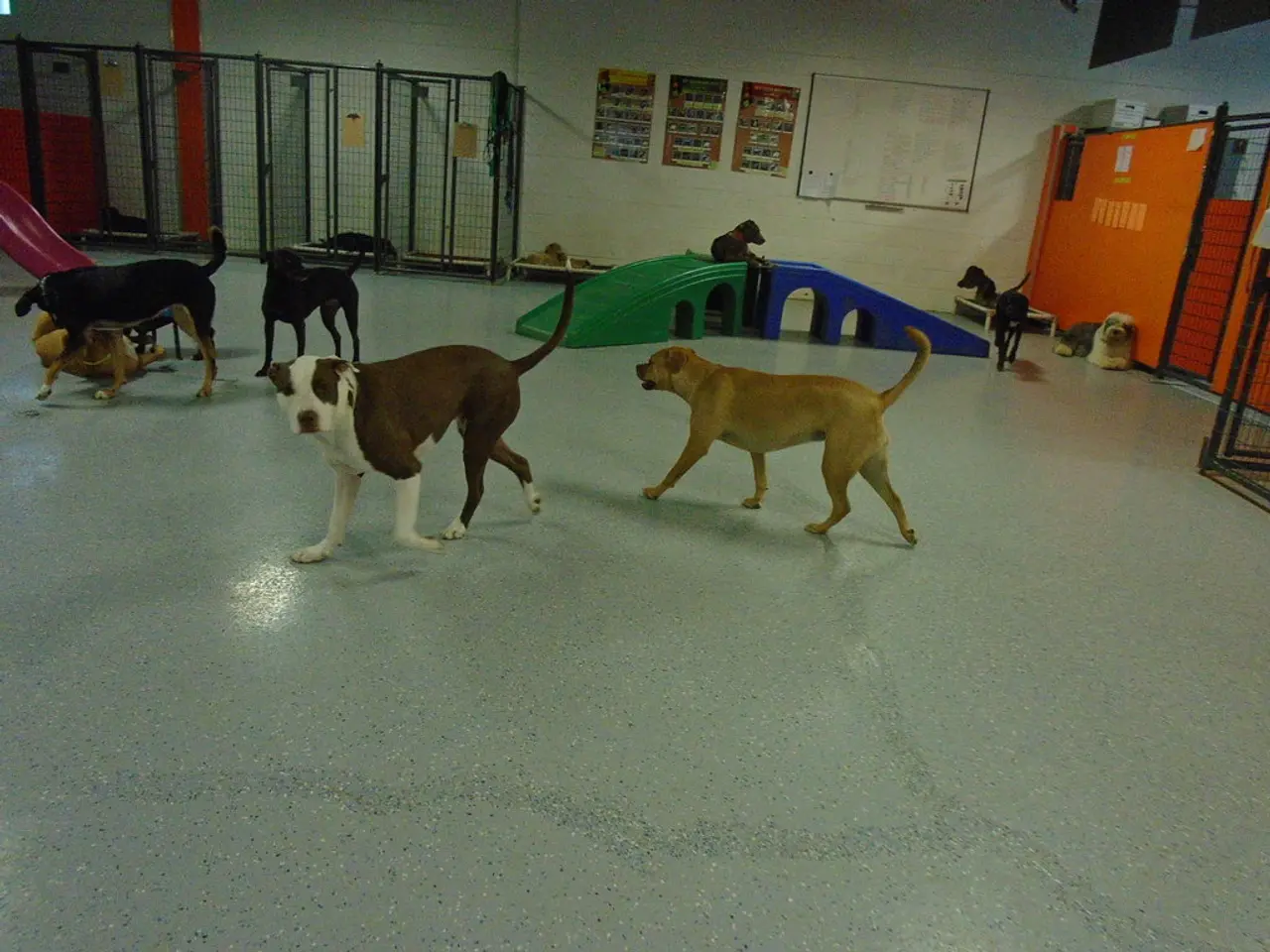A New Era for Dog Welfare in the ACT: Proposed Code of Practice
Pet proprietors may be required to devote three hours daily to their canines under proposed Australian legislation
The Australian Capital Territory (ACT) Government has unveiled a draft Code of Practice for the Welfare of Dogs, marking a significant step towards modernising and clarifying dog ownership standards[1][2]. This comprehensive code encompasses both companion and working dogs, and aims to improve their comfort, security, and overall well-being[1][2]. The draft is currently open for public consultation until August 22[2][3].
A Minimum of Three Hours with Your Canine Companion
One of the key proposals is that dog owners must provide a minimum of three hours of daily human contact to each dog[2][4]. This requirement underscores the importance of social interaction for canine welfare and represents a shift from previous, less explicit standards. The exact nature of "human contact" is not exhaustively defined in the public documents, but it is understood to mean active engagement—such as walking, playing, training, or simply being present with the dog—rather than merely being in the same household[2][4].
Enforcement and Legal Status
The Code of Practice includes both mandatory requirements and recommended guidelines. Failure to comply with mandatory standards, like the three-hour human contact rule, could result in penalties under the Animal Welfare Act[2][3]. On the other hand, non-compliance with guidelines alone does not constitute an offence, but these guidelines may inform enforcement decisions and support prosecutions in cases of neglect or cruelty[2][3].
The Animal Welfare Advisory Committee (AWAC), which includes the RSPCA, acknowledges that enforcement will be challenging—especially for subjective requirements like "human contact"—and is seeking feedback on how to make rules practical and measurable[3].
Defining 'Human Contact'
The code does not provide a strict, technical definition of "human contact" in the current draft[2]. Instead, it sets a minimum duration (three hours daily) without specifying the quality or type of interaction required[2][4]. The expectation is that this contact involves meaningful engagement that meets the dog's social and emotional needs, but the details are left open to interpretation and community feedback during the consultation period[2][3].
Other Key Provisions
The code also covers various aspects, including surgical debarking and the use of dog leashes[1]. Additionally, it provides guidance on breeding practices, supervision of children with dogs, housing compatible dogs together, collar fit, positive reinforcement training, parasite control, and information sharing when rehoming[1].
Public Consultation and Next Steps
The ACT Government is actively seeking feedback from dog owners, industry stakeholders, and the public to refine the code before finalization, particularly on how to define and enforce the "human contact" requirement and other subjective standards[2][3]. This reflects a recognition that effective animal welfare regulation must balance clear standards with practical enforceability.
The new proposed legislation also includes tougher penalties for animal cruelty and the introduction of new offenses such as hitting or kicking an animal, abandonment, or confinement in a car likely to cause injury, stress, or death[3]. Furthermore, residents are legally allowed to break into a car to protect an animal if there are no other feasible options, like calling the police[3].
The proposed Code of Practice for the Welfare of Dogs in the ACT is a significant step towards ensuring the well-being of our canine companions. With the link provided, the public is encouraged to share their thoughts and opinions on this groundbreaking legislation[3].
[1] Australian Capital Territory Government. (2021). Code of Practice for the Welfare of Dogs. Retrieved from https://www.legislation.act.gov.au/view/html/inforce/current/actsl-2004-013/sch-4#sch-4
[2] Australian Capital Territory Government. (2021). Consultation on the Code of Practice for the Welfare of Dogs. Retrieved from https://www.yoursay.act.gov.au/code-practice-welfare-dogs
[3] RSPCA ACT. (2021). ACT Government Proposes New Legislation for Dog Welfare. Retrieved from https://www.rspca.org.au/act/news/act-government-proposes-new-legislation-dog-welfare
[4] ABC News. (2021). ACT Government Proposes New Laws to Protect Dogs. Retrieved from https://www.abc.net.au/news/2021-05-28/act-government-proposes-new-laws-to-protect-dogs/100371084
- This new Code of Practice for the Welfare of Dogs in the ACT aims to improve the comfort, security, and overall well-being of both companion and working dogs, including providing a minimum of three hours of daily human contact.
- Failure to provide the minimum three hours of daily human contact could result in penalties under the Animal Welfare Act, but the precise nature of "human contact" is not fully defined and is open to interpretation in the current draft.
- The Animal Welfare Advisory Committee recognizes the challenges in enforcing subjective requirements like "human contact" and is seeking feedback on how to make the rules practical and measurable.
- In addition to the three-hour human contact requirement, the code also covers issues such as surgical debarking, the use of dog leashes, breeding practices, and the importance of positive reinforcement training.




